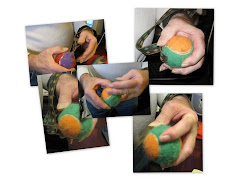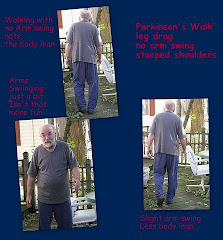Why the neck? The neck is muscle, tendon, ligament, bones and joints. And what happens to the Parkinson's body is a tightening of those elements.
 Don't ignore the early symptoms because that is the best time to make serious inroads into slowing the progression of PD.
Don't ignore the early symptoms because that is the best time to make serious inroads into slowing the progression of PD.Other early symptoms of Parkinsons disease can be resting tremors, cramped handwriting, shuffling gait, lack of arm swing, fatigue and stiff shoulders. All can be ascribed to other lifestyle experiences. Since most testing is done on men, it is not known if women also suffer an early loss of sense of smell as well.
Ok ladies, don't enjoy having the discomforts of having a period? Here's a reason to rethink that attitude. Studies have discovered that women who are fertile longer (that's the onset of menstruation to menopause) have a reduced risk of developing PD. Women on hormore replacement therapy (HRT) did not appear to have a reduced risk. The odds go down somewhat if you have had HR and a hysterectomy. And are worse if you have only had a hysterectomy.
According to a study funded by the Thomas Hartman Foundation for Parkinson's Research and the National Institutes of Health, women whose fertile period lasted for 39 years were found to have a 25% lower risk factor than those who had a 33 year span.
Because estrogen impacts mental state, mood, cognition and locomotion, The Michael J Fox Foundation is currently funding a study into developing Estrogen Replacement-beta agonists.
It has also been found that women who had 4 or more pregnancies were more likely to develop PD if they also had long periods of postpartum depression - a time when the estrogen hormones are at their lowest.
 What about all those coffee/tea studies? Women often drink a lot of coffee. Well it is confusing but it appears that one study found that the incidence of PD was higher for non-coffee drinkers 10.5 cases per 10,000 per year but dropped to 5.5 for those drinking 4-8 ounces per day, 4.7 for 12-36 ounces, 3.6 for 20-24 ounces and wow! 1.7 if they drank just under a quart. In other words non-coffee drinkers wer 5X more likely to develop PD and this study took smoking (a protective PD agent) into account. So how does this impact women? It didn't work as expected. Post menopausal women on HRT who drank lots of coffee were actually 1.5X more likely to develop PD than those women not on hormone replacement therapy. However, women who didn't drink much coffee and were on HRT were 65% less likely to develop PD.
What about all those coffee/tea studies? Women often drink a lot of coffee. Well it is confusing but it appears that one study found that the incidence of PD was higher for non-coffee drinkers 10.5 cases per 10,000 per year but dropped to 5.5 for those drinking 4-8 ounces per day, 4.7 for 12-36 ounces, 3.6 for 20-24 ounces and wow! 1.7 if they drank just under a quart. In other words non-coffee drinkers wer 5X more likely to develop PD and this study took smoking (a protective PD agent) into account. So how does this impact women? It didn't work as expected. Post menopausal women on HRT who drank lots of coffee were actually 1.5X more likely to develop PD than those women not on hormone replacement therapy. However, women who didn't drink much coffee and were on HRT were 65% less likely to develop PD.What do women want? According to a 2001 study of Swedish women they appear to want the same things as men do and perhaps a bit more because of their roles after retirement. Stable body image, traditional role competence, to be accepted for the person they are, and not to suffer stigmatazation. They wish to be free of the uncertainty and frustration that can occur with impaired mobility and cognitive skill loss. They do not want to be forced into social withdrawal. They want to remain the nurturers for their families, they want to maintain that all important quality of life.
In general men are diagnosed with PD from 1.3 to 3.9 rate over women. Oddly enough the story does not appear to be the same in Japan where a study indicated that women developed PD about 33% more often than men at least in one particular area of the country.
references and resources:
http://www.michaeljfox.org/newsEvents_parkinsonsInTheNews_article.cfm?ID=463
http://insciences.org/article.php?article_id=2750
http://esciencenews.com/articles/2009/02/25/naturally.produced.estrogen.may.protect.women.parkinsons.disease http://www3.interscience.wiley.com/journal/118952776/abstract
http://content.karger.com/ProdukteDB/produkte.asp?Aktion=ShowFulltext&ArtikelNr=000065527&Ausgabe=228645&ProduktNr=224263
http://parkinsons-disease.emedtv.com/parkinson
http://www.sciencedaily.com/releases/2006/04/060414002812.htm
http://www.neurologicalresourcecenter.org/news/09mar/articles/MarFeature.htm
Sometimes doctors don't hear women with PD














No comments:
Post a Comment
Welcome to Parkinsons Focus Today.
We are delighted to hear from you by comment here
or through email as found in Contact Us.
Please do not include email addresses if leaving a comment online.
Email addresses are used only for email responses.
Spammers take note: your messages will not be published. The comments section is for an exchange of ideas, not for backlinks.